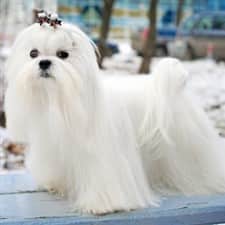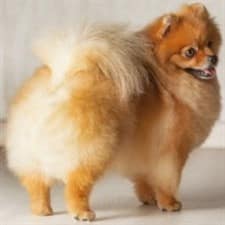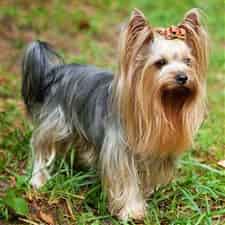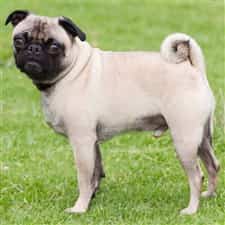Chihuahua Size and Weight
Overview
There are two very different aspects to a Chihuahua's size and weight. There is the expected size as a breed in general and there is the size and weight of each Chihuahua as an individual. It is important to make this distinction since many pet Chihuahuas will not fall within the expected weight range of the breed standard.
This section will explore how big Chihuahuas are per breed standards of all major kennel clubs, actual weight of pet Chihuahuas, how the Chihuahua compares in size to other breeds, and Chihuahuas that fall outside of expected size (undersized, over-sized, under-nourished, and overweight).
Please note:
PetChiDog is reader-supported. Some of the product suggestions on this page are affiliate links. As an Amazon Associate we earn from qualifying purchases. This is at no extra cost to you and helps keep this site running.
Breed Standard Size and Weight
Weight:
The breed standard weight for the Chihuahua with well-recognized kennel clubs is as follows:
AKC:
Not to exceed 6 lbs. (2.72 kg).
CKC
(Canadian Kennel Club): Not to exceed 6 lb. (2.72 kg), 2-4 lb. (1-2 kg) preferable.
FCI:
1.5 to 3 kg (3.3 to 6.61 lbs.) preferred. A lesser weight of 500 grams (1.10 lbs.) and 1.5 kg (3.3 lbs.) is tolerated. Subjects weighing less than 500 grams (1.10 lbs.) and more than 3 kg (6.61 lbs.) shall be disqualified.
KC:
1.8 to 2.7 kg preferred (3.96 to 5.95 lbs.).
So, as you can see, there is a general agreement that a Chihuahua in the show ring will be under 6 pounds (2.72 kg) with the FCI allowing him to be a tad larger, 6.61 lbs. (3 kg). This said, many pet Chihuahuas are 7, 8, 9 or even 10+ pounds, and this will be covered up ahead.
Height:
Though there is no listed height with any of the major kennel club breed standards, Chihuahuas 6 lbs. (2.72 kg) and under are generally 6 to 9 inches tall. This is measured from the withers (top of the shoulder blades) to the floor.
Chihuahua Size and Weight Compared to Other Toy Breeds
While the Chihuahua is indeed the smallest breed based on breed standard weight and expected height, some other toy breeds are tiny as well and some are much larger. Let's compare a few popular toy breed dogs to the Chihuahua:
Chihuahua

Weight: 6 lbs. (2.72 kg) and under
Height: 6 to 9 inches (15 to 22.8 cm)
Maltese

Weight: under 7 lbs. (3.17 kg)
Height: 8 to 10 inches (21 to 25 cm)
Pomeranian

Weight: 3 to 7 lbs. (1.4 to 3.2 kg)
Height: 7 to 12 inches (18 to 30 cm)
Yorkshire Terrier

Weight: 7 lbs. (3.17 kg) or under
Height: 8 to 9 inches (20 to 23 cm)
Cavalier King Charles Spaniel

Weight: 13 to 18 lbs. (6 to 8 kg)
Height: 12 to 13 inches (30.5 to 33 cm)
Pug

Weight: 14 to 18 lbs. (6 to 8 kg)
Height: 10 to 12 inches (25.5 to 30.5 cm)
Actual Weight of Pet Chihuahuas
If you have a Chihuahua and are wondering if he or she is at a normal weight for this breed, it is best to look past the breed standards and instead look to how your dog compares to other Chihuahuas.
For this, a survey that we conducted at the start of 2018 is a good reference.
Though the survey was answered by 3272 owners, the question of weight was asked just to those with Chihuahuas age one year and up; therefore, when we asked, 'How much does your Chihuahua weigh?', 2715 owners answered as so:
2.5 lb. (1.13 kg) 5%
3 lb. (1.36 kg) 3%
3.5 lb. (1.58 kg) 3%
4 lb. (1.81 kg) 6%
4.5 lb. (2.04 kg) 4%
5 lb. (2.26 kg) 11%
5.5 lb. (2.49 kg) 7%
6 lb. (2.72 kg) 7%
6.5 lb. (2.94 kg) 8%
7 lb. (3.17 kg) 7%
7.5 lb. (3.40 kg) 6%
8 lb. (3.63 kg) 5%
8.5 lb. (3.85 kg) 5%
More than 8.5 lb. (3.85 kg) 23%
Let's break this down a bit.
Out of 2715 Chihuahuas, only 46% met the AKC's standard of not exceeding 6 lbs. (2.72 kg).
The majority of adult Chihuahuas, 61%, were over 6 lbs. (2.72 kg).
And 23% were over 8.5 lbs. (3.8 kg).
This was not the only surprising stat revealed in our comprehensive survey (the full results are included in our book, PetChiDog's GIANT Book of Chihuahua Care), but is certainly one of the most interesting.
Why Chihuahuas Range in Size
Reputable breeders that focus on producing Chihuahuas that fit the breed standard will generally have Chi that fall in the 2 to 6 lb. range as adults. Often, champion dogs are used to establish reliable lines that consistently produce desired size and other physical attributes. Top picks of the litter (with ideal conformation including size) may be kept for future breedings, thus keeping certainly in the program. If the breeder is considering adding an outside Chihuahua into their program, research will be done to ensure that certain physical traits, including weight, are seen going 3 to 5 generations back.
But, contrary to this, there are many hobby breeders and pet owners that have litters that are not so meticulously planned. One over-sized dam or sire can be responsible for many generations of large Chihuahuas.
In addition to this, some breeders aim for the higher end of the standard, close to the 5 or 6 lb. range since very tiny Chihuahuas can have more health issues than more sturdy ones and are more prone to size-related injury such as being stepped on.
The final aspect that plays a role in this is the possibility that a Chihuahua is carrying excess pounds. This may seem odd to someone with a standard-sized Chi; however, even this tiny toy breed can become overweight. This is covered up ahead.
Over-Sized Chihuahuas
If your Chihuahua is well over 6 pounds, the first thing to assess is if this is a matter of body structure or excess fat. If this is simply your dog's natural body structure, don't give this any more thought; the majority of Chihuahuas are larger than 6 pounds and are perfectly healthy.
If you cannot feel your dog's ribs or see the outline of them when your dog is wet from a bath, and particularly if this is paired with mobility issues, this is a sign that your dog may be carrying excess weight.
This said, the veterinarian will be able to do a full assessment for this and be able to rule out certain health issues
that can cause weight gain such as canine diabetes and conditions such as patella luxation or arthritis that can limit a dog's ability to exercise.
If a Chihuahua is given a clean bill of health but is carrying excess pounds, a combination of fewer calories and more activity can gradually get a Chihuahua back on track.
In regard to food, you may wish to consider a switch to a low-calorie kibble. If you are offering a top-quality food, stick with the same brand, if possible. For example, if you are giving your Chihuahua one of the Wellness recipes, a good choice is Wellness Complete for Small Breeds - Healthy Weight .
.
Snacks, which can make up 20 to 30% of a dog's diet plays a role as well. For this, Fruitables Skinny Mini Dog Treats
 are a great option to offer tasty all-natural tidbits with only 2 to 3 calories a piece.
are a great option to offer tasty all-natural tidbits with only 2 to 3 calories a piece.
Gradually increasing exercise is also part of this. The basic exercise requirement
for this breed is a minimum of two walks per day for at least 20 minutes, done at a brisk pace. This should be the goal for sedentary dogs and if a Chihuahua is already meeting this, adding on an extra walk, adding on 10 minutes to each walk, or engaging your dog in a daily session of cardio such as fetch can be done.
Under-Sized Chihuahuas
While there is no minimum weight per the AKC breed standard, a fully grown adult Chihuahua that weighs under 2 lbs. (.9 kg) will most often be considered undersized.
Though not an official variation of this breed, dogs this tiny are often referred to as miniature, toy, or teacup Chihuahuas.
Whether or not this is an unhealthy state depends on a particular dog's height, bone structure, and level of nutrition; however, Chihuahuas this small do tend to have several issues to contend with.
With trauma being the 2nd leading cause of death for the Chihuahua (second only to cardiovascular disease), tiny Chi will be susceptible to a wide range of injury. This includes accidents at home like being stepped on or tripped over and activity-related injuries such as bone sprains and breaks. Jumping from heights (like the sofa) should be restricted.
Collapsed trachea may be seen at higher rates as well; though recommended for all Chihuahuas, using a harness, not a collar, will be beneficial.
There may be issues with hypoglycemia which requires frequent meals throughout the day and trouble with maintaining body temperature that may require sweaters to be placed on the dog, even when indoors.
It is not uncommon for very small Chihuahuas to have issues with their appetite; in some cases, even when gaining one pound would be advantageous, a small Chi will have trouble taking in the required number of calories. In these instances, a supplement like Tomlyn NutriCal for Dogs
 can help.
can help.
Weight Guideline by Age
Most Chihuahuas are at their full adult size by the 9 month mark, though some will have small gains and/or fill out until the 1 year mark.
Weight gain is most noticeable during the first 6 months. While there will be an upward trend, it is normal for there to be starts and stops. Some weeks may bring a significant increase and other weeks will be slower. Since weight gain is not linear, weight charts can only offer a general guideline.
Weight Range of Chihuahuas According to Age:
Note that this is based on actual adult weights, not just the 6 pounds maximum as seen in the breed standard.
Birth: 2.5 to 5.5 ounces
2 Weeks: 5 to 13.5 ounces
4 Weeks: 1/2 to 1.5 pounds
8 Weeks: 1 to 2.5 pounds
3 Months: 1.5 to 3.5 pounds.
4 Months: 1.25 to 4 pounds
6 Months: 2.5 to 6 pounds
Fully Grown Adult Chihuahua: 2 to 10 lbs. (.9 kg to 4.5 kg)
You may also be interested in the full Growth Chart.
